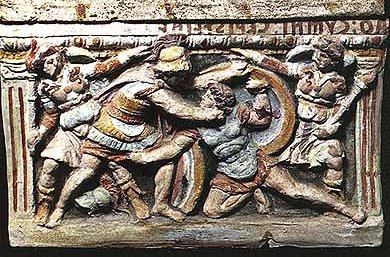 Readers of "The Seven Against Thebes" might enjoy
this little introduction to the themes and personalities
in ths play.
Readers of "The Seven Against Thebes" might enjoy
this little introduction to the themes and personalities
in ths play.
 Readers of "The Seven Against Thebes" might enjoy
this little introduction to the themes and personalities
in ths play.
Readers of "The Seven Against Thebes" might enjoy
this little introduction to the themes and personalities
in ths play.
Aeschylus wrote this play for presentation in 467 BC, where it won first prize in the tragedy division of the annual Athenian dramatic contest.
Before Aeschylus, Greek plays featured a single character in dialogue with the chorus. Aeschylus is supposed to have originated the idea of having a second character onstage (Eteocles and the scout, Antigone and Ismene), talking with each other.
Before we had reliable birth control, population pressures made war between neighboring communities inevitable. Whole towns would be enslaved or exterminated so that the conquerors could expand. The chorus in "The Seven Against Thebes" describes, in vivid detail, what happened to the conquered people.
Real security was offered only by the "empires", i.e., huge protection rackets such as contemporary Persia. In return for keeping peace, empires would bleed communities of their resources. And even this security was only temporary, since empires themselves often were at war with each other. When Aeschylus wrote this play, the Athenians and Spartans had just successfully resisted Persia's attempts at domination. The Greeks felt that this represented a triumph for a freer way fo life. In Sparta, independence was maintained by an extremely disciplined military culture. Athens, by contrast, experimented with democracy and cultural innovation. The question, "What is the best form of government?" was on everybody's mind.
We don't know how much of Aeschylus's play about the Greek town of Thebes is history. But the story of "The Seven Against Thebes" was extremely popular in classical times. It seems reasonable to think that people remembered that Thebes once withstood a massive onslaught by her neighbors, with the common pretense of it being a war of royal succession.
We don't know whether there were really seven allies, or whether this has something to do with the fact that Thebes supposedly had seven gates in her fortifications. Of course it is only required to breach one gate. Whether it is wiser to have everybody attack a single gate, or to have seven different commands attack seven different gates (thus leaving soldiers under their own national commanders, and spreading the defenses thin), would be a question for a professional military leader.
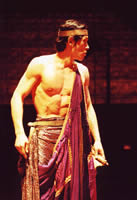 According to the classic story,
the two sons of Oedipus, Eteocles and Polynices,
had agreed to alternate as king year by year.
Of course, this was a monumentally
bad idea. In the era of primitive city-states,
it guaranteed that the government would be unstable,
and invited foreign attack.
But for some reason,
the town went along with it.
According to the classic story,
the two sons of Oedipus, Eteocles and Polynices,
had agreed to alternate as king year by year.
Of course, this was a monumentally
bad idea. In the era of primitive city-states,
it guaranteed that the government would be unstable,
and invited foreign attack.
But for some reason,
the town went along with it.
Eteocles ruled for the first year. As the end of the year approached, Eteocles let it be known that he would remain king. He had a stable government, and he thought it was not in the interest of his city (or his own interest) to give Polynices his turn.
Polynices took advantage of the situation. By making promises, he gathered an alliance of the surrounding Greek towns ("the Argives") to take Thebes and replace Eteocles's administration permanently. Those who allied against Thebes hoped to gain control of it at little cost.
There are many versions of "The Seven Against Thebes", including the names of the "seven" leaders. Some say that Oedipus's curse had something to do with it. (Perhaps it was the curse on Oedipus, or as Sophocles suggesed in "Oedipus at Colonus", it was retribution because the two boys hadn't helped their father when he was blind and homeless.) But the basic story is the same.
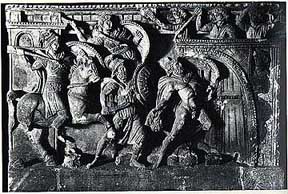
As the play opens, the armies from the surrounding towns have laid siege to Thebes, i.e., they have surrounded it and are waiting to starve the people out. So far, things in the city are stable. Eteocles greets a group of citizens and bluntly reminds them that he is their king. He is responsible for the survival of the community, whether times are good or bad. If thing go well, Eteocles will give credit to God / Zeus. If anything goes bad, everybody will blame him, because he is the king. His psychics just told him that the other Greeks (the Argives) are planning to attack. He calls on all men, even youngsters and old able-bodied men, to take up arms, to fight hard, trust God, and not be afraid.
The scout comes in and confirms that enemy arming and preparing for battle. Eteocles piously calls on the gods to keep the city from being destroyed and its people from slavery. As if bargaining, he adds that a prosperous country honors the gods. And he begs the personified curse of Oedipus not to destroy the city. Notice that Eteocles does not ask that his own life be spared.
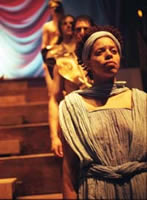 |
The chorus of women comes in. They are very frightened by the sound
of the attacking army. They talk about running
off to pray to save them from slavery. (A victorious army would kill
the men and take the younger women as sex slaves.) As they call on the
various gods, they also hear the battle progressing.
Eteocles comes in and is very angry with the chorus. Etiocles turns out to be quite the misogynist. He talks about not liking to live with women, since when things go well they are bossy, and when things go badly they go hysterical. Their agitation is bad for morale, and he tells them to get off the street and be quiet. |
The chorus says they're just afraid. Eteocles makes pious talk about the gods, but urges them to honor "Obedience, the mother of Success and wife of Rescue." In other words, it's more important for you to due your part as citizens, even if it just means keeping your mouth shut. Eteocles says the sacrificial bloodletting is being done by the soldiers -- killing the enemy. The chorus agrees to quiet down, and Eteocles goes to prepare defensive positions.
I became interested in Greek tragedy during the era of Vietnam war protests. The similarities and differences between the two situations are obvious.
The chorus continues to pray to the various gods. They mention vividly what will happen to young unmarried girls -- they will be raped and dragged off. The city and surroundings will be looted and people slaughtered.
Next we are treated to a catalogue of "The Seven Against Thebes."
| GATE | ATTACKER (Emblem on shield) |
ABOUT THE ATTACKER | DEFENDER | ABOUT THE DEFENDER |
| Protid | Tydeus (Moon and stars) |
Tydeus's
psychic will not let him cross the river yet. This Tydeus had brought Eteocles the request from Polynices to let him take his turn as king, as promised. Tydeus was mugged for his efforts. Tydeus was the father of Diomedes, the Trojan War hero. Tydeus is mentioned as being buried at Thebes in the Iliad. |
Melanippus | Brave fighter, one of the few survivors of the race that sprang from the dragon's teeth |
| Electran | Capaneus Unarmored man with torch |
He is big talker. Other old legends have it that he was killed by lightning for his ungodly talk while climbing the Theban wall, that his wife burned herself with his body, and that he was raised by Aesclepius. The business about his being killed by a thunderbolt perhaps comes from the chorus's expressed wish in this play. |
Polyphontes | Others say that this was the name of the herald of Laius, who Oedipus killed. |
| Neistan | Eteoclus Armed warrior climbing a ladder |
He is whirling his horses. | Megareus | Creon's son |
| Onca | Hippomedon (Smoke-breathing Typhon) |
He is raving. | Hyperbius | Has Zeus on his shield. Zeus defeated Typhon. |
| North | Parthoenopaeus (Sphinx eating a Theban) |
He is from Arcadia in Argos. | Actor | Brother of Hyperbius |
| Homoloid | Amphiaraus (Blank) |
He is a good fighter and a decent man.
He is also a psychic.
He criticized Tydeus for deciding to attack instead of lay
siege. He calls Tydeus a bloodthirsty fool.
Amphiaraus knows he will die today. |
Lasthenes | Hates foreigners. Quick eyes. Young man with an old man's wisdom. |
| Seventh | Polynices Lady Justice restoring Polynices |
He is praying to the Theban gods. | Eteocles | Brother will fight brother. |
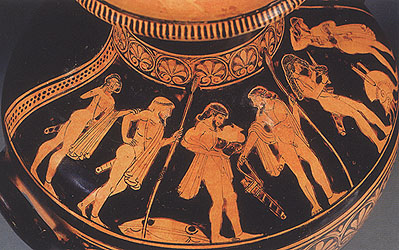 Eteocles has already chosen the best people to fight each previous champion.
So Eteocles is left
to go out against his brother.
Eteocles has already chosen the best people to fight each previous champion.
So Eteocles is left
to go out against his brother.
The next passage is rich with ideas. The chorus is horrified by Etiocles's choice to fight his own brother, since family killing family seems to be the family's curse. Brother killing brother is an evil, ungodly thing. Eteocles says that if you're going to have do something terrible, you can at least do it without dishonor.
The chorus says Etiocles's emotions are getting the best of him. (What do you think?) Instead, Eteocles says he sees God's hand here, the fitting end to his family story, a chance to make everything right.
According to Eteocles, since "the gods" no longer care for him, then Eteocles can at least die with dignity and grace. He says, "The gods, it seems, have already banished us from their care, yet they admire the grace we offer them when we perish. So then, why should we cringe and shy away from deadly fate?"
The chorus begs Eteocles to reconsider -- perhaps destiny will change. The chorus calls on him to be cautious. The difficult line is nikên ge mentoi kai kakên timai theos (they-are-winning but to-bad-people payment-for-value the-gods) Smyth translates this as "Any victory, even a cowardly one, is nonetheless held in honor by God." Morshead translates it as "Yet the god loves to let the weak prevail." Ask your teacher which one is better. Eteocles replies, "A soldier must not think that."
Again, the chorus asks how he can kill his own brother. Eteocles replies, "When it is the gods who give you evils, you cannot flee them."
The chorus sings about the horrors of the curse of the house of Oedipus. A messenger comes in. At the first six gates, the Theban defender won. But Apollo took charge at the seventh gate, and fulfilled the curse. Eteocles and Polynices killed each other.
Antigone and Ismene come in with the bodies of Eteocles and Polynices.
They mourn. A herald comes in and announces that Polynices's body is not
to be buried, but left for scavengers, like roadkill.
There will be no memorial service.
Many of the Greeks had the idea that if your body was
not given the burial ritual,
your soul could not find a place in the afterlife.
Antigone announces that she will bury Polynices. An argument follows. Here are the main points.
The government says...
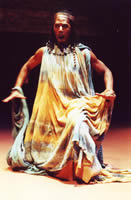 Antigone says...
Antigone says...
Antigone's famous act of civil disobedience was celebrated in Sophocles's wonderful play of the same name.
The chorus says the city's decree is harsh and it may change its mind, but for now they are going to the victory celebration and the funeral of Eteocles, whose leadership saved the city.
Dying bravely in defending his city, Eteocles -- good soldier and effective leader -- finds his personal meaning for life and his answer for death.
To think about: Could Eteocles be what we could call today a "secular humanist", one who does not believe in "the gods" and blames religion for society's problems? There must have been such people in freethinking Athens. Is this a theme of the play? You decide!
For the business about "tragic flaws", see my notes on Oedipus.
Image Cluster: Horses
They were extremely important to the Greeks, in war and peace.
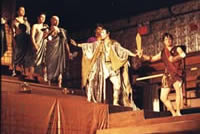 Comparing running a government to guiding a ship must have been old
even in Aeschylus's day.
Comparing running a government to guiding a ship must have been old
even in Aeschylus's day.
 Aeschylus presents the earth as the great mother of all, the source
of all good things, what we are fighting for, and
so forth.
Aeschylus presents the earth as the great mother of all, the source
of all good things, what we are fighting for, and
so forth.
 If you paid attention to the emblems
on the shields, you'll see Aeschylus's point.
If you paid attention to the emblems
on the shields, you'll see Aeschylus's point.
After they repelled the Persian attack, the people of Athens thought that they could develop institutions that would make the future better than the past had been. The Athenian experiment was not perfect. But it was a foundation of the system of law and of thought that has brought us the unparalleled health, safety, and freedom that we enjoy today.
Readers of the Iliad remember the shield of Achilles, which bore pictures of a happier life. In Aeschylus, the sequence of shields looks to an era where stable institutions would prevent terrible events like those in "The Seven Against Thebes".
And why does the play conclude with Antigone's expression of compassion and spirituality? "The Seven Against Thebes" ends with the hope that human beings can rise above hatred and revenge and find meaning in love and kindness, rather than simply killing and dying bravely.
It's a message for us, too.
To include this page in a bibliography, you may use this format: Friedlander ER (1999) Enjoying "The Seven Against Thebes" by Aeschylus Retrieved Dec. 25, 2003 from http://www.pathguy.com/7thebes.htm
For Modern Language Association sticklers, the name of the site itself is "The Pathology Guy" and the Sponsoring Institution or Organization is Ed Friedlander MD.
Links
|
The Seven Against Thebes -- a personalized, modern account The Seven Against Thebes Aeschylus Text |
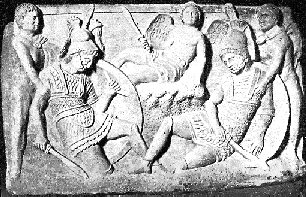 |
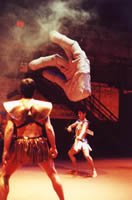
|
Statius's Thebiad [my link is down] is
sympathetic to Polynices. Unlike the historical Eteocles (or whoever
actually led Thebes during the war),
Statius wrote in an era where there was enough
law to have allowed a shared government. Some of the pictures are from a U. of Sydney archeology site which is presently down. |

 I'm Ed.
You can visit me at my own page
and
follow the links from there to my autopsy page, my
notes on disease (the
largest one-man online medical show, helping individuals
around the world), my Adventure
Gaming sites, or any of the other sites.
I'm Ed.
You can visit me at my own page
and
follow the links from there to my autopsy page, my
notes on disease (the
largest one-man online medical show, helping individuals
around the world), my Adventure
Gaming sites, or any of the other sites.
You can E-mail me at scalpel_blade@yahoo.com. No texting or chat messages, please. Ordinary e-mails are welcome.
Brown University, Department of English -- my home base, 1969-1973.
| New visitors to www.pathguy.com reset Jan. 30, 2005: |
Is your instructor a proponent of a side in the
culture
war? If so, here's how to make him/her happy and still tell the truth!
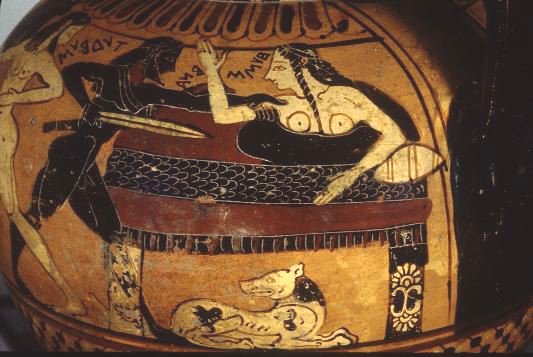 | In another of the many versions of "The Seven Against Thebes", Tydeus attacked Ismene, daughter of Oedipus. This is depicted on this Etruscan vase. There's a sphinx on the other side. |